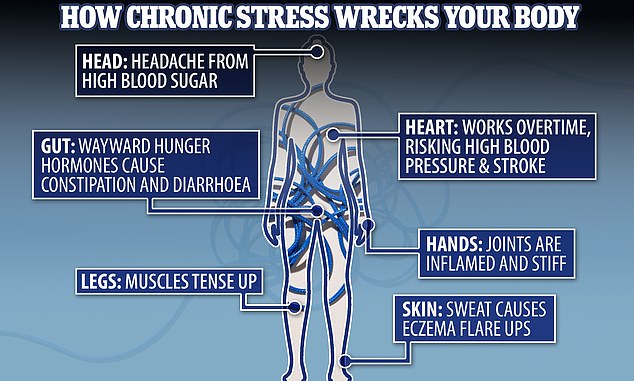Years of smoking, excessive drinking and overeating are factors that cause cancer.
Over time, these habits are believed to cause damage to DNA and weaken our body’s defenses, creating the perfect environment for tumor formation.
But research is beginning to suggest that a single traumatic event could be linked to the development of the fatal disease years later.
A bitter divorce, a family death or a serious injury can leave a lasting impression on you, affecting your response to stress for the rest of your life and potentially increasing your risk of cancer.
Women who experienced a traumatic event, such as a car accident or assault, and had PTSD symptoms were twice as likely to develop ovarian cancer as women who were not traumatized. a 2019 study of more than 54,000 women found.
A 2022 study Among 278 patients, the majority of patients diagnosed with head, neck and pancreatic cancer were found to have faced a different, stressful life event within five years of discovering their cancer.
However, other research has found less conclusive links. A 2016 study of more than 100,000 Women in the UK found no link between adverse life events and breast cancer risk.
Scientists have investigated the link between cancer and chronic stress for decades.
“We all have stress in our lives. Please don’t think that if you have a stressful day, you’re going to get cancer now.” Nicole Andrews, a registered dietitian who specializes in oncology, said on TikTok.
Short-term stress, which you may experience while running errands, before speaking in public, or before preparing for sports, probably does not increase your risk of getting cancer.
Your body can withstand brief moments of stress.
However, a single traumatic event can lead you to develop depression, anxiety, or PTSD, all of which can lead to lifelong problems with stress. according to the NIH.
This is called chronic stress. You may experience it over a prolonged period of time while in a toxic work environment, while processing childhood trauma, or while dealing with unemployment.
Chronic stress is what doctors believe actually causes the cellular changes in the body that could eventually lead to cancer, according to Dr. Cohen.
This is because when you have this type of stress, your body constantly produces hormones like cortisol and adrenaline, which activates the body’s “natural alarm system.” According to Mayo Clinic.
These chemicals make your heart beat faster, raise your blood pressure, and increase the amount of sugar in your blood to give you more energy.
They also cushion your body’s systems that aren’t immediately needed in a fight-or-flight situation, reserving energy that would be used, for example, to support your immune system in sending blood to your muscles, allowing you to move more quickly.
In short-term stress, these effects quickly disappear.
But if you can’t calm down for an extended period of time, this can weigh on your body, weakening your immune system, making you depressed, and causing digestive problems. Dr. Anil Sood said a professor of Gynecologic Oncology and Reproductive Medicine at MD Anderson.
This potentially makes it easier for cancer to grow, both because it increases the risk of diseases like heart disease and diabetes that can lead to cancer, and because the stressed immune system is less prepared to fight cancer.
“Chronic stress can also help cancer grow and spread in several ways,” Dr. Sood said.
It could be that when someone is stressed, they are more likely to act in ways that increase their risk of getting cancer: starting to smoke, drinking or stopping exercising, according to the National Cancer Institute (NCI).
This should not make people facing a cancer diagnosis feel guilty. Dr. Daniel Bruetmansaid a medical oncologist at City of Hop Cancer Center in Chicago.
“They may feel that if they had endured ‘less stress,’ they wouldn’t have gotten cancer or the treatments would have worked,” Dr. Bruetman said.
The reality is that the link is not clear and no one should feel guilty about their stress: there are many other factors that could play a bigger role in the likelihood of developing cancer, such as genetics and dietary and exercise habits.
However, you can do everything you can to learn to manage chronic stress, Dr. Cohen said.
For some people, this might be as simple as removing a toxic person from their life. But for others, managing stress might involve seeking therapy, practicing meditation or improving sleep habits, Dr. Cohen said.
She focuses especially on sleep, saying that “getting eight hours of sleep each night is a great defense against stress.”


